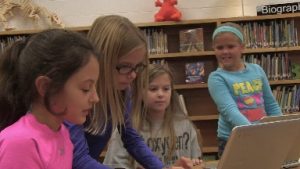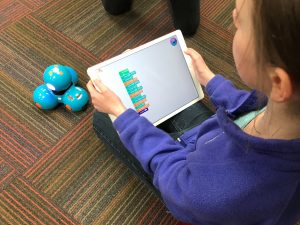2018 School Spending Survey Report
Librarians Use "Ready to Code" Grants, Learn From Each Other
Librarians from across the country are helping ALA create a toolkit of coding resources.
A range of resources
“You might think of it as almost a choose your own adventure,” says Marijke Visser, who has been the ALA project lead ever since the collaboration with Google started two years ago. “[Say] I’m a small rural library and I want to design a program for middle school girls. In theory, I will be able to go into this toolkit and pick and choose different things we know have been successful in other instances with that kind of program. Or ‘I want to have a program that uses mentors from the local community college.’ In theory, you would be able to go in and see that and a handful of things would come back to you that you could pick and choose from.”
Courtesy of ALA
The grant recipients from public and school libraries across the country are using the money and resources in different ways. Some are creating new programs, while others are adding to already established ones, all looking to find the best plan for the future. At Belmar (NJ) Elementary School, Danielle Arnold started a coding club for fourth through eighth graders at her small, suburban K–8 school. The club was supposed to be one day a week, but enrollment was so overwhelming that she now runs three separate clubs. Had she known how popular it would be, she might have made it a few shorter programs instead of a yearlong curriculum. It's just one of the lessons so far. "It's all stuff I'm learning," says Arnold, who is thrilled at the response, particularly among kids who are normally more reserved at school. All of her club kids are anxiously awaiting the new 2-in-1 computers that were purchased with the grant money, and the local public library has even chipped in to provide more devices for the program. But her real goal goes beyond adding equipment. “Our ultimate goal [is that] it’s going to be a mentoring program,” she says. By early February, the fourth through eighth graders will run a workshop for the younger kids, with each partnered to help an individual student. “I just want the little ones to get exposed to it,” she says. “The older kids are actually really excited to work with the younger ones, and that was kind of the basis of the whole grant.” Throughout Ready to Code, Visser has learned that staff capacity is a big issue for librarians who want to begin coding and computer science programs. Bringing in mentors can help with that need. At the Homer (AK) Public Library, Claudia Haines is using mentors as well. “Our initiative is called Makers to Mentors. I start there because our initiative is really targeting computational thinking in computer science, programming, coding from preschool through high school and multiple family programs,” she says.
In Homer, AK, kids BETA test a coding robot.
With a few exceptions, Haines is using the grant to add to and modify existing programs. “What we decided was we wanted to build off what we were already doing and make talking about computational thinking, talking about computer science more intentional in the things we were already doing and then add in either tools or opportunities that would build off of those,” she says.MORE THAN MONEY
Grantees of this cohort manage their individual library project(s), but they also have weekly webinar conversations that allow them to learn from each other and discuss challenges and solutions. With such difference in experience among the libraries, Haines wondered how they could help each other. How, for example, would a large, urban library’s issues, relate to hers? It turns out, there is common ground. “We really know our community and our library, so when someone asks a question - maybe they’re from a big urban library - I’m able to pull out pieces I know are relevant,” Haines says. “These weekly conversations allow us the space to figure out what is replicable with different tools or in a different space. Talking about outcomes – is the outcome really that you just want 75 kids or are there different outcomes? If you only have 12 teenagers in your community, you can still reach that outcome? I’ve been really happy with the questions and the feedback we’ve been giving each other in that light.” Visser is thrilled as well. “To have this community of practice really growing and supporting one another, it’s really exciting to see,” she says. Thanks to a travel stipend, many of the grantees will meet in person at ALA’s MidWinter Conference in Denver in February. “They’ll have a workshop where we’re really going to get down and dirty with their feedback,” says Visser. “We’re working on the way that resources will be curated and organized in the toolkit and a framework of how it will actually look when you go online to check out the resources, what might be missing.” The toolkit is not just going to be coding curriculum, but also the information on how to connect with the needed community resources. “It’s a lot more than just CS First or Hour of Code,” says Visser. “It’s package deal."RELATED
RECOMMENDED
CAREERS
The job outlook in 2030: Librarians will be in demand
CAREERS
The job outlook in 2030: Librarians will be in demand
ALREADY A SUBSCRIBER? LOG IN
We are currently offering this content for free. Sign up now to activate your personal profile, where you can save articles for future viewing






Add Comment :-
Be the first reader to comment.
Comment Policy:
Comment should not be empty !!!